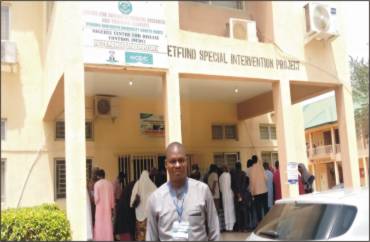
Deadline for Submissions: 25th October 2025
Publication: Special Issue of the Nigerian Journal of Biochemistry and Molecular Biology (NJBMB)
The Nigerian Society of Biochemistry and Molecular Biology (NSBMB) has announced a national call for Position Papers in support of the Bill for an Act to Establish the Institute of Chartered Biochemists and Molecular Biologists of Nigeria (ICBMBN, Cap HB.1164) — a landmark legislation currently before the National Assembly.
This call aims to mobilize voices from academia, research institutions, industry, and policy circles to advocate for the professional recognition, regulation, and protection of Biochemistry and Molecular Biology (BMB) practice in Nigeria.
A Defining Moment for the Profession
Biochemistry and Molecular Biology form the molecular foundation of life — underpinning every branch of biological, medical, agricultural, and allied health sciences. From medicine, nursing, and medical laboratory science to agriculture, veterinary medicine, microbiology, and biotechnology, Biochemistry provides the essential framework for understanding life at the molecular level.
Despite its central role in national development, the practice of Biochemistry and Molecular Biology in Nigeria remains unregulated and professionally unprotected, leaving the discipline vulnerable to encroachment by allied fields. This lack of legal recognition has hindered innovation, created professional uncertainty, and diluted the identity of Biochemists across the country.
Legislative Breakthrough and Renewed Momentum
The proposed ICBMBN Bill (Cap HB.1164) represents a historic effort to establish a statutory regulatory body for Biochemists and Molecular Biologists in Nigeria. The Bill has already passed its Second Reading and successfully underwent a Public Hearing at the National Assembly on Thursday, 9th October 2025, signaling strong legislative support and renewed optimism within the scientific community.
If enacted, the Bill will:
- Protect the professional identity and autonomy of Biochemists and Molecular Biologists;
- Establish ethical and professional standards for practice;
- Foster innovation, research excellence, and collaboration; and
- Align Nigeria’s professional framework with global standards as seen in other countries.
An earlier version of the Bill, passed in 2018 but declined presidential assent due to administrative gaps, has now been revised to address previous concerns — representing a stronger, clearer, and nationally beneficial framework.
Why the Urgency?
Globally, Biochemistry and Molecular Biology enjoy chartered and professional recognition under well-defined institutions such as:
- The American Society of Biochemistry and Molecular Biology (ASBMB),
- Belgian Society of Biochemistry and Molecular Biology (BSBMB),
- South African Society of Biochemistry and Molecular Biology (SASBMB),
- Korean Society of Biochemistry and Molecular Biology (KSBMB), and
- The International Union of Biochemistry and Molecular Biology (IUBMB), among others.
Nigeria’s Biochemistry community, represented by the NSBMB, deserves similar professional protection and visibility. Without legal backing, Biochemistry faces what experts describe as an existential threat, as allied professionals encroach into its teaching, regulation, and practice — a situation found nowhere else in the world.
Call for Position Papers
To galvanize national support and deepen intellectual advocacy, the Nigerian Journal of Biochemistry and Molecular Biology (NJBMB) — the official publication of the NSBMB — invites Position Papers from scholars, professionals, policymakers, and other stakeholders.
Contributors are encouraged to submit papers addressing key themes such as:
- Legislative and policy perspectives on professional regulation;
- Ethics, identity, and standards in Biochemistry practice;
- Curriculum and accreditation frameworks for academic institutions;
- Research, innovation, and national development;
- Global benchmarking and international best practices;
- Cross-disciplinary encroachment and professional boundaries;
- Industrial relevance, public health, and food security; and
- Youth empowerment and career development through professional recognition.
Each Position Paper should be 3–5 pages (maximum 2,500 words) and will be peer-reviewed for inclusion in a Special Issue of NJBMB titled “Legislative Advocacy for Professional Recognition in Biochemistry and Molecular Biology.”
Submission Guidelines
- Manuscript Type: Position Paper
- Length: 3–5 pages (maximum 2,500 words)
- Submission Deadline: 25th October 2025
- Further Details: www.nsbmb.org.ng/support4icbmbnbill
- Publication Type: Special Issue of NJBMB
- Submission Channel: icbmbnbill@gmail.com
A Call to Action
According to Stanley I.R. Okoduwa PhD, Director of ICT at NSBMB and Correspondence Contact for the Call,
“This is a defining moment in the history of Biochemistry and Molecular Biology in Nigeria. The passage of the ICBMBN Bill is not just about legal recognition — it is about safeguarding the integrity, future, and identity of a profession that sustains all life and health sciences.”
Members of the Biochemistry community are therefore urged to lend their voices and expertise to this national cause. Through collective advocacy and scholarly engagement, Nigeria can finally give Biochemists and Molecular Biologists the recognition they deserve.
Contact Information
Correspondence:
Dr. Stanley I.R. Okoduwa
Director, ICT — Nigerian Society of Biochemistry and Molecular Biology (NSBMB)
📧 office@nsbmb.org.ng icbmbnbill@gmail.com
📞 +234 805 584 3993







